#chinese idiom
Text
🌿🌕✨
外国的月亮比较圆 - “the moon is rounder in other countries”
A funny phrase I learned today, the equivalent of “the grass is always greener on the other side”!
Do you feel that way sometimes too? 🌝
#proverb#vocab#mandarin#chinese language#mandarin chinese#chinese#mandarin vocab#language learning#chinese vocab#mandarin langblr#mandarinblr#idiom#chinese idiom
389 notes
·
View notes
Text
Possible Chinese Idioms in Tartaglia’s Normal Attack and Xingqiu’s Burst
By the way, Tartaglia’s Normal Attack “Cutting Torrent” is actually 断雨 (duànyǔ) in Chinese, which literally means something like “severing rain”, but it possibly refers to the idiom 断雨残云 (duàn yǔ cán yún). Literally it’s “severing rain, damaging clouds”, referring to the act of disrupting something that’s going on. Not to be confused with Xingqiu’s Burst “Raincutter” which was originally 裁雨留虹 (Cái Yǔ Liú Hóng), an “idiom” that HoYoverse made up, literally meaning something like “cutting the rain, leaving behind a rainbow”. It’s possibly inspired by the real Chinese idiom 裁云剪水 (cái yún jiǎn shuǐ) which refers to poetry that’s exquisite and original… or something, which would fit Xingqiu’s novelist position, Hydro element, and carrying out the wuxia code of chivalry in his own way, I think?
#dusk rambles#Genshin translation#idioms#Chinese idiom#Chinese#Xingqiu#Childe#Tartaglia#Genshin impact
56 notes
·
View notes
Text
成语故事 – 望梅止渴
望梅止渴 / wàng méi zhǐ kě
lit: "to quench one's thirst by imagining plums"
meaning: to relieve hurt / console oneself by imagining something good/illusions
生词:
部队 (部隊) / bù duì / army, troops
讨伐(討伐) / tǎo fá / to send (army) to suppress / crusade
叛军(叛軍)/ pàn jūn / rebel group/army
正直 / zhèng zhí / just when...
随身(隨身) / suí shēn / to carry (on one's person)
携带(攜帶)/ xié dài / to carry (TW pronunciation: xī dài)
喝光 / hē guāng / to drink all of, to drink up/finish
体弱(體弱)/ tǐ ruò / debility
中暑 / zhòng shǔ / heatstroke
晕倒(暈倒)/ yūn dǎo / to pass out, faint
向导(嚮導)/ xiàng dǎo / guide, escort
绕路(繞路)/ rào lù / to make a detour
饥渴(飢渴)/ jī kě / hungry and thirsty
沉思 / chén sī / to ponder, contemplate
声张(聲張)/ shēng zhāng / to disclose, make public
加把劲儿(加把勁兒)/ jiā bǎ jìn er / to make extra effort
解渴 / jiě kě / to quench thirst
仿佛(彷彿)/ as if
步伐 / bù fá / pace
故事:
东汉末年,曹操率领部队去讨伐叛军张绣。当时正值盛夏,太阳火辣辣地照着大地,将士们随身携带的水中就喝光了,行军速度越来越慢,有几个体弱的士兵还因为中暑晕倒在路边。看到这种情况,曹操非常着急,他立刻叫来向导,悄悄问他:“这附近有没有水源?”
向导摇了摇头,说:“最近的水源也在山谷的另一边,要绕路才能过去。”
曹操看了看饥渴的士兵,沉思了一会儿,对向导说:“你专心带路吧,不要声张,水的事情让我来想办法。”
说完,曹操骑马爬山一个山头,他假装向远处看了看,然后扭过头对士兵们说:“大家加把劲儿,我找到解渴的东西了!”
士兵们一听,一下子来了精神,忙问:“什么东西?”
曹操指了指前方,说:“这条路我以前曾经走过,我知道在前面不远的地方有一片梅林,梅子结得又多又大,到了那儿就可以解渴了。”
士兵们听了,口水直流,仿佛已经吃到了酸甜可口的梅子,顿时觉得没那么渴了,步伐也随之加快了。这时,曹操派人快步翻过山谷,取来水,士兵们痛快地喝足了水,又继续赶路了。
#chinese langblr#mandarin langblr#chinese learning#chinese#langblr#mandarin chinese#language learning#mandarin#learning languages#成语#idiom story#idiom#idioms#chinese idiom#成语故事#vocab#100
136 notes
·
View notes
Text
Chinese Idioms and Proverbs
What if swords in Mulan 2020 had actual Chinese sayings instead of “loyal, brave, true” as engravings.

1. Hua Mulan:
日久见人心 (rì jiǔ jiàn rén xīn)
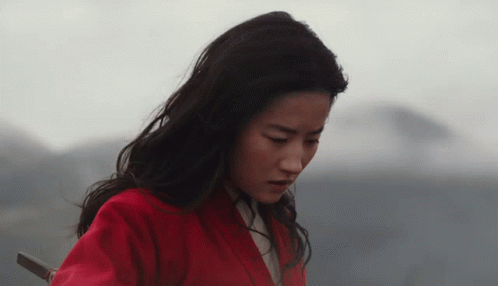
This is actually just the second half of the proverb "路遥知马力,日久见人心", which translates to “distance tests a horse’s strength, time reveals a person’s character”. I’m only taking the second half for simplicity’s sake. Besides, 日久见人心 on its own manages to cover the meaning & intention behind the whole saying in my opinion.
日久见人心 (“time reveals one’s heart”) beautifully encompasses Mulan’s story of disguising as a man in place of her father to go to war solely out of love for her father, all while proving her capabilities along the way and coming to slowly accept & embrace her truest expression of her self, making this saying more than worthy to be engraved onto Mulan's new sword.
2. Hua Zhou:
逆境出人才 (nì jìng chū rén cái)
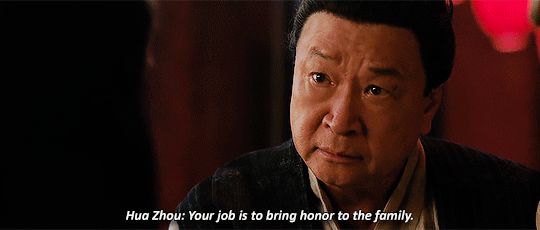
逆境出人才 has the meaning of “adversary breeds talent/flair”. This saying could reflect in some way Hua Zhou’s adamant attitude when faced with life’s situations/decisions, e.g. insisting he must serve the army even though he’s frail & had done his part before. (I like to speculate his stubborn determination was the reason he managed to accomplish much & got far as a soldier during his prime, therefore earning his sword engravings and becoming highly-regarded in the military.)
However, I chose this proverb not as much because I think it would be suitable for Hua Zhou’s character, but rather for how it will affect Mulan’s journey in her training to become a soldier when she took her father’s sword to war. (It’s the sword with the most screen time, by the way.) The engravings would serve as a reminder as well as an encouragement for her to strive to be the best warrior she could be.
As Mulan develops as a person, the old "逆境出人才" nicely transitions into the new "日久见人心" in poetic fashion. Plus, both would go along neatly with the “pattern” of five-character sword engravings running through the Hua family, in this case.
3. Commander Tung:
否极泰来 (pǐ jí tài lái)
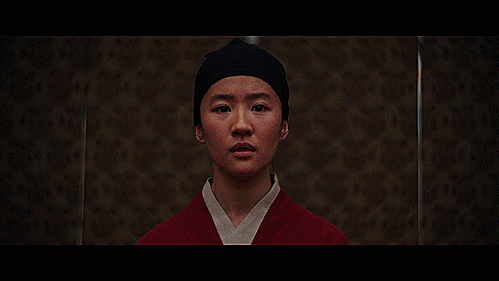
For Commander Tung, 否极泰来 (meaning “peace comes after extreme evil”) would sound really cool & badass for a general like him (one who’s played by Donnie Yen no less) to the point where I feel like he would totally own it on the battlefield without a question.
4. Sergeant Qiang:
惩前毖后 (chéng qián bì hòu)
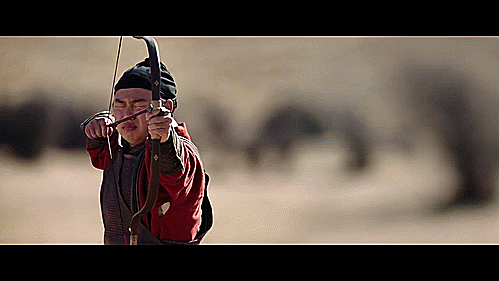
Remember that second-in-command who’s strict and uptight about Mulan & her comrades’ performance and was given the “we’ll make a man out of every single one of you” line? I did.
惩前毖后 (literally “punish first, prevent later”) has the meaning of criticizing or learning from past mistakes to avoid future ones and preventing them from happening again. Very fitting for Sergeant Qiang’s personality, and it gives extra insight into why he acted so strictly towards the new recruits.
5. The Emperor:
尽忠报国 (jìn zhōng bào guó)

You may recognize this saying because it was popularized by Chinese folk hero & semi-historical figure Yue Fei (similar to Mulan). As you can tell, 尽忠报国 has everything to do with “loyal devotion to your country”.
While such an engraving is befitting of an emperor’s sword, I think it would be hilarious seeing the other main characters having sword engravings that have their own poetic/badass meanings whereas the Emperor’s is probably the most basic shit you could put on a sword.
6. Chen Honghui:
知音难觅 (zhī yīn nán mì)

Considering Chen Honghui’s role in Mulan’s journey, I think 知音难觅 would make a unique sword engraving for him since this idiom is one that’s about friendship.
The idiom means “an intimate friend is hard to find”, and seeing that Honghui had been nothing but an ally of Mulan through and through, there’s no other saying best encompassing his character. Since he’s staying in the military, I like to believe he would go on to become a leader that’s known to be supportive, encouraging & even caring not only to his peers but also his juniors as well.
Tagging @delphiniumblooms :)
#non sw#disney#disney live action#mulan 2020#mulan live action#mulan remake#mulan live action remake#hua mulan#hua zhou#commander tung#sergeant qiang#the emperor#chen honghui#chinese language#chinese idiom#chinese proverb#meta
48 notes
·
View notes
Text
成語故事 Chinese Idiom History :指鹿為馬 zhǐ lù wéi mǎ
lit: to point to a deer, and call it a horse
meaning: deliberately misrepresent things; flipping black and white, or right and wrong.
指 - point
鹿 - deer
為 - as
馬 - horse
The Chinese language has interesting four-character idioms called 成語 (chéng yǔ), and there are some interesting history behind all of them. Today, we look at the story behind 指鹿為馬.
Zhao Gao (趙高) was a shrewd politician serving as the carriage officer during the time of Qin Shi Huang, the founding emperor of the Qin Dynasty around the early 3rd century BCE.
When Qin Shi Huang died, Zhao Gao colluded with the younger son of the emperor to intimidate the Chancellor to secretly change the emperor’s final edict to name the younger son Huhai as heir, circumventing the older son Fusu. Huhai eventually become Emperor Qin the Second and Zhao Gao became a favoured official of the new emperor.
Zhao Gao eventually rose to the position of Chancellor after framing the previous chancellor for treason. Still unsatisfied, Zhao Gao wanted to obtain more power, but fearing oppositions among the civil and military officials, Zhao Gao came up with a trick to test their loyalty.
Zhao Gao brought in a deer before the emperor and officials, he proclaimed: “Behold, a horse!”. The emperor laughed: “The Chancellor must be mistaken, calling this deer a horse”.
Zhao Gao then asked his fellow officials whether the deer is indeed a deer, or a horse. Some officials - fearing Zhao Gao’s authority - kept quiet. Others, seeking to gain Zhao Gao’s favour, said it was a fine horse. But some others replied that it was most definitely a deer and not a horse.
Zhao Gao, seeing the deer-callers unwilling to submit to his authority, then schemed to have them removed from their role, exiled or killed. After this incident, all the officials regarded Zhao Gao in fear.
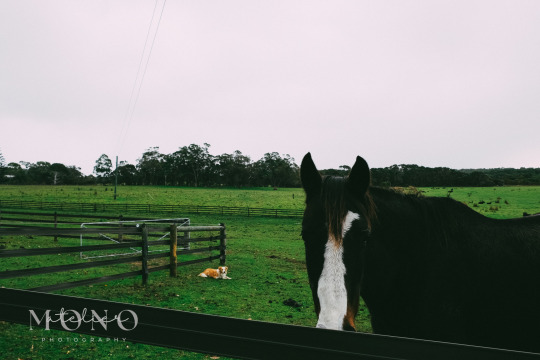
Interesting enough, the Japanese language also uses the characters for horse and deer in their word for ‘stupid, idiot’: 馬鹿 バカ. Perhaps, they are referring to those who cannot differentiate between a horse and a deer.
#chinese#chinese learning#chineseblr#mandarinblr#chinese history#chengyu#chinese idiom#learn chinese#langblr#中文#漢語
33 notes
·
View notes
Text
Langblr Reactivation Challenge - Week 1, Day 6
大家好!今天是第六天的Langblr Reactivation Challenge!
今天的写作提示是:Look up 3 idioms in your target language and explain what they mean and how you use them in a sentence (with an example!).
Since I currently have 3 main target languages, I will do one for each of them :)
三分钟热度 - san1 fen1 zhong1 re4 du4 - lit. three-minute heat
Used to refer to a short burst of enthusiasm and interest about a subject. This is a useful idiom for me because for many things, my interest ends up being pretty short LMAO
ex. 我学日本语只有三分钟热度。
Ter um coração de pedra - lit. have a heart of stone
Used to refer to someone with no empathy for others.
ex. Você não apoia a saúde universal? Você tem um coração de pedra!
Avoir un coup de foudre pour quelqu'un - lit. have a bolt of lightning for someone
Used when one falls in love with someone very fast, at first sight.
ex. J'ai un coup de foudre pour mon nouveau camarade de classe.
If I messed up any of the uses or contexts of these idioms please let me know! Idioms are always one of the harder things I have to learn for any language, so I appreciate any help or even any additional idioms that you guys enjoy or use frequently!
#langblr#language resources#learning portuguese#learning mandarin#learning french#learning languages#foreign languages#language#idioms#chinese idiom#português#português brasileiro#langblr reactivation challenge#français#中文
6 notes
·
View notes
Text
天马行空 - a heavenly steed soaring across the skies
1. (figuratively, of literary composition, life, etc.) powerful and unrestrained in style; bold and imaginative; abounding with novel ideas
2. (figuratively) progressing swiftly; unrestricted and developing rapidly
3. (figuratively, derogatory) speaking in a roundabout, irrelevant or exaggerated way; empty and impracticable talk
Source: Wiktionary
2 notes
·
View notes
Text
闺房之乐,有甚于画眉者
“Marital intimacy contains even more than painting eyebrows.” -Zhang Chang to Emperor Xuan of Han when he was reported for ‘improper male conduct’ after helping his wife paint her eyebrows.
Zhang Chang's wife had been scarred in childhood and he made a practice of helping her paint her eyebrows to hide the scars.
Zhang Chang essentially was telling the Emperor he had no business telling a man how to express love and affection towards his wife.
Emperor Xuan was deeply touched by Zhang Chang's love for his wife and allowed him to continue.
The idiom "Zhang Chang traces eyebrows (张敞画眉)" would become synonymous with marital love and affectionate couples.
0 notes
Text
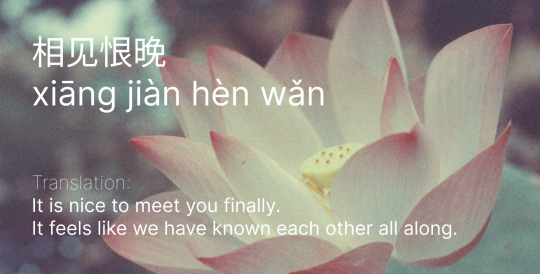
0 notes
Text
misogyny in linguistics
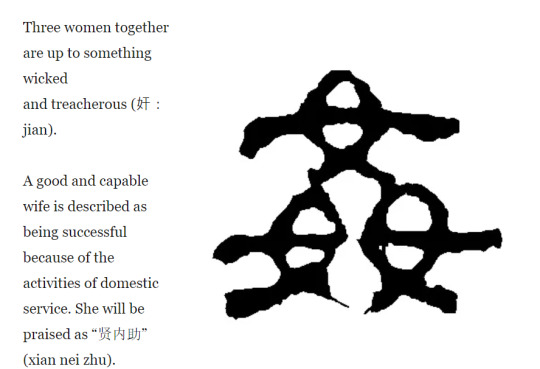
everything containing “ 女 “ (female) in chinese character etymology means something negative, cunning, devious, dark, or to indicate a servant. studying and knowing all those characters sickens me to the core. confuscianism furthered this in east asia weakening women’s rights - before confuscianism, korean dynasties had female kings and some property rights.
though we often use different chinese characters in each cases, china - korea - japan
screenshots source
the origin of the “female” character is a woman kneeling
in other explanations in confuscian texts, it says it is an image of a person kneeling with their neck in a pillory
on the contrary, the letters for “man” 男 is a person with the power 力 to feed 10 十 (shi) 口 (gou) mouths= family
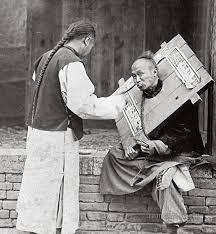

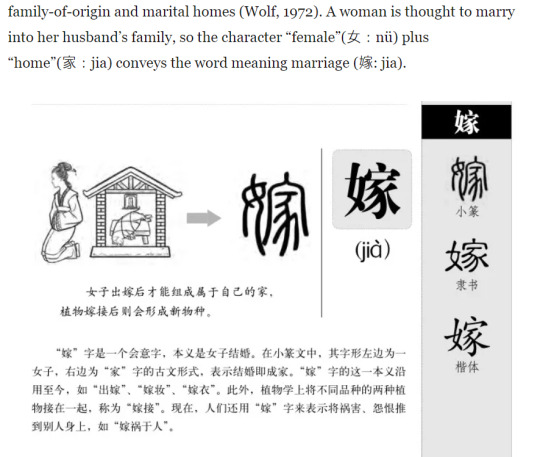
Wife as housemaid
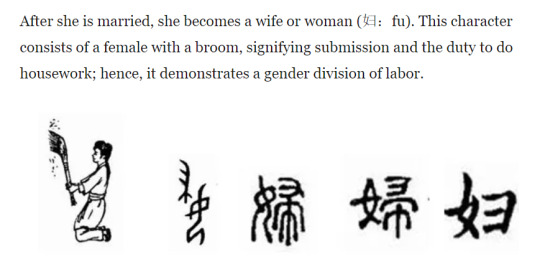
a woman outside a home(under her husband) is not safe
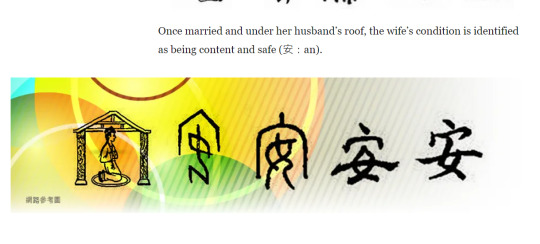
women with other women are always plotting
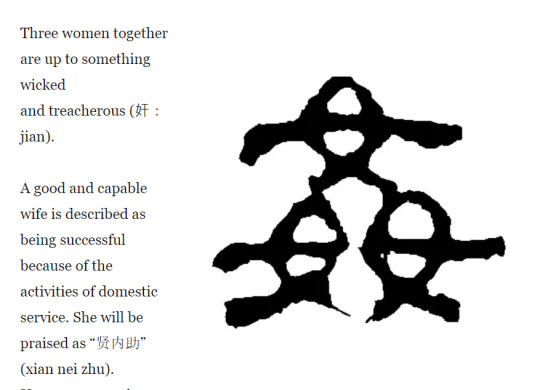
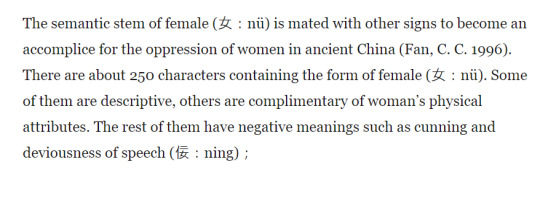
a man is allowed to have multiple wives, especially if she does not bear children: but he does not generally need justification. a women should never be jealous, jealousy (contains chinese character for female) is one of the 7 sins that husbands could banish, or beat their wives for
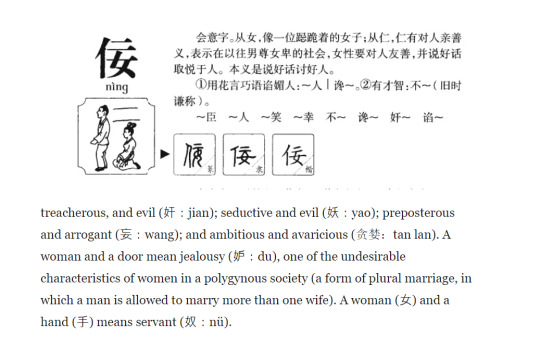
women + hands = servant
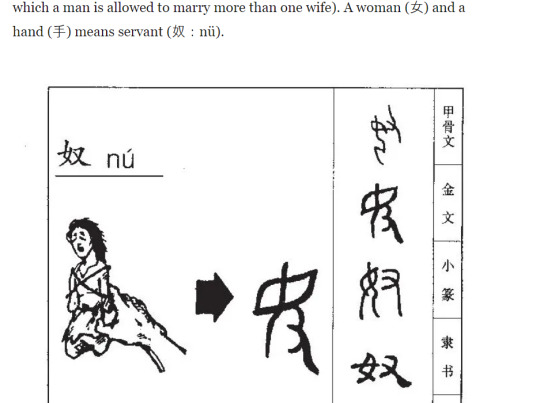
add fire onto the mix of the same characters of “servant”, you got “anger”
a lot of negative emotions in chinese characters are associated with symbols of women
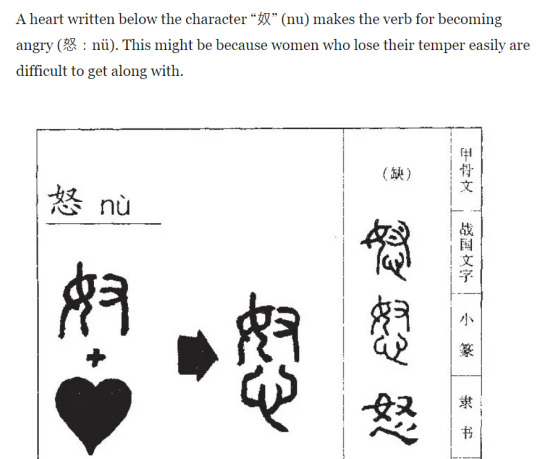
“Power” : women subjugated under a weapon

fraught mentions of female inferiority
남존여비 is a word often brought up in korean culture, as in males are precious and respectable “ 尊 ” and females are inferior by birth “ 卑 “ . Men are high, women are low. Gentlemen comes first
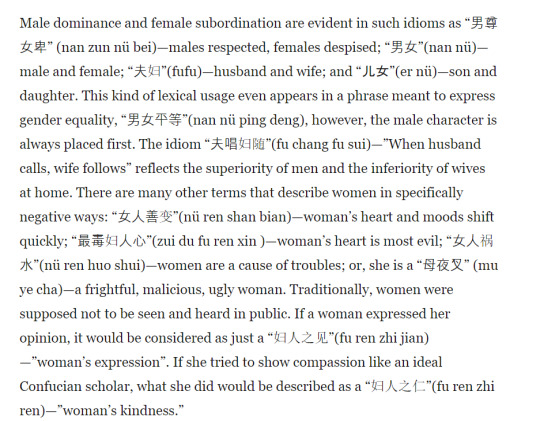
https://bild-lida.ca/educationalsociolinguistics/uncategorized/womens-oppression-and-chinese-characters/
嫌 for extreme “hate” = women
adultery = dark cunning thing that women do
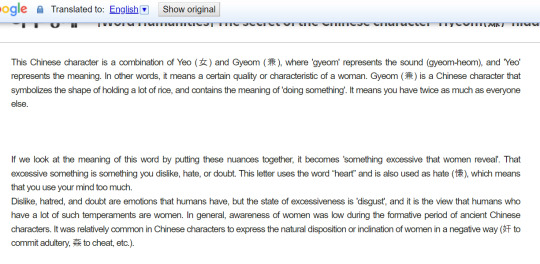
not all chinese characters with “women” have bad meanings! Some have positive meanings soch as detailing women’s looks or her docility
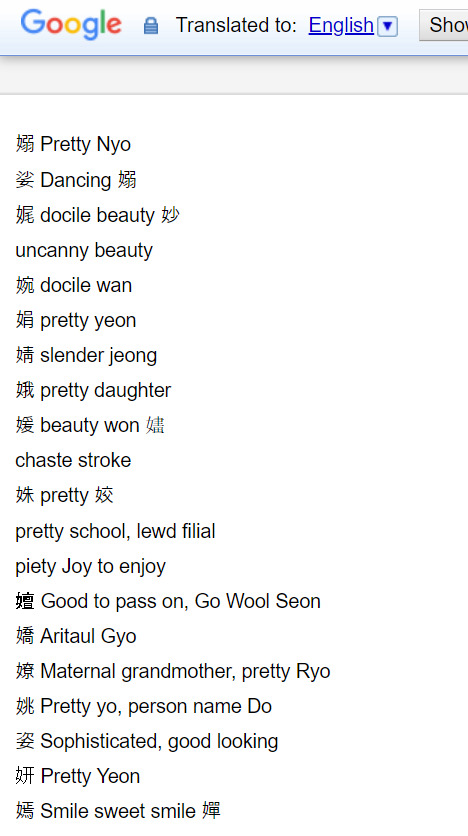
there are few if not zero chinese characters with the male “ 男 “ used inside a character contrary to the female “ 女 “ as a descriptor.
#i wanted to put chinese idioms here but guess that some idioms are same in every country#theres the exact same word for word ancient saying in chinese#korean italian and russian#you should beat women once in a while to subdue them#if women get power the world crumbles#etc#the tidbit about hens crowing bringing the house down#(cuz roosters aka men should rule not women=hens/cats#are the same in scottish proverbs?#Asian languages on the other hand? Uh good luck understanding a single word...#misogyny#mine
289 notes
·
View notes
Text
纸上谈兵
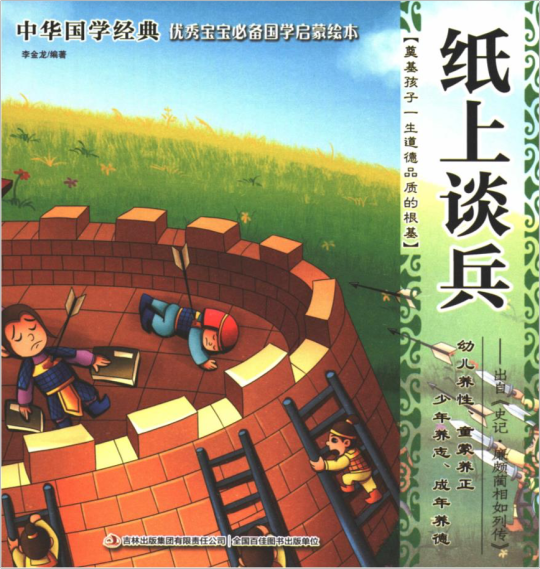
纸上谈兵 (zhǐ shàng tán bīng) – literally, “to discuss military strategy on paper”
Meaning – “inflexible theory will not solve real-world issues in practice” or even as a descriptor meaning “armchair strategist”
大家好!
Welcome back everyone for another 成语 aka Chinese idiom or proverb, brought to you by yours truly, 萝卜!Today we will be learning 纸上谈兵!This is a real historical story about the Battle of Chángpíng (长平之战) during the Warring States period in ancient China but it definitely still has relevance today. I’m sure you can all imagine a time where being “book-smart” has landed someone in hot water! Let’s get to it!
During the Warring States period, General Zhào Shē (赵奢) famously repelled an invading Qín army while significantly outmanned, becoming a hero of the Zhào kingdom (赵国). His son, Zhào Kuò (赵括) surrounded himself with military books, reading them over and over until he could handily defeat both peers and military officers in discussions about military strategy. Consequently, Zhào Kuò developed quite a reputation as a strategic genius! (With arrogance to match!) Despite this, his father feared that he simply recited theory and lacked the flexibility required in real battle. He warned the country officials that, should his son ever lead an army, the country would suffer a great defeat. This fell on deaf ears, however, as they assumed “like father, like son”. Surely it would work out...
Later, after Zhào Shē passed away, a protracted battle was occurring at Chángpíng between the Qín and Zhào armies. Led by another famous general named Lián Pō (廉颇), the Qín army could not break through. Instead, they started a rumor: “Oh the Qín army is soooo afraid of Zhào Shē’s son, the famously brilliant strategist!!” As the rumor spread, the king of Zhào sent Zhào Kuò to replace Lián Pō, who was elated to finally get to put his knowledge to the test. Upon arrival, Zhào Kuò changed the entire strategy, much to the chagrin of the soldiers. Without a choice though, they followed his orders into battle, where all 400,000 of them were lost in battle, including Zhào Kuò!
And that’s it! Did you enjoy the story? Not a very happy ending (unless you’re from the kingdom of Qín, who did eventually unify China!) but a fitting pair to 熟能生巧 (“practice makes perfect”). It’s one thing to be book-smart, another to put it into action! While it’s good to build knowledge, don’t be afraid to hop in and start practicing whatever you want to improve! Your mind is a muscle too! 💪
Here are the other idioms that popped up in this story:
以少胜多 (yǐ shǎo shèng duō) – “using few to defeat many”, meaning “to win from a position of weakness”
哑口无言 (yǎ kǒu wú yán) – “dumbstruck and unable to reply”, meaning “left speechless” or “at a loss for words”
虎父无犬子 (hǔ fù wú quǎn zǐ) – “a lion father cannot have a dog for a son”, meaning “like father like son”, though n.b. this would exclusively be used in a positive manner! More like “with such a distinguished father, the son is sure to do well”.
听信谣言 (tīng xìn yáo yán) – “to take heed of idle chatter”
See you next time! 再见!
#成语#chengyu#idiom#chinese idiom#纸上谈兵#vocab#mandarin vocab#chinese vocab#language learning#chinese language#mandarin chinese#langblr#mandarinblr#mandarin langblr#mandarin#chinese
58 notes
·
View notes
Text
行云流水 (xing yun liu shui) -> (lit.) traveling clouds, flowing water -> (idiom) (of a singing/writing style) graceful
Xing yun liu shui…🤔
0 notes
Text
成语故事 – 熟能生巧
Another idiom story that's right at my level!! Full story below the cut. This is essentially the Chinese equivalent of "practice makes perfect", or this idea that the more familiar/proficient you become at a skill, the more you find the tricks to it.
熟能生巧 / shú néng shēng qiǎo
生词:[ HSK4 / HSK 5 / HSK 6 ]
射箭 / shè jiàn / to shoot arrows; archery
本领(本領)/ běn lǐng / skill
老翁 / lǎo wēng / old man
担子(擔子)/ dàn zi / burden, carry a pole over shoulders with loads on both sides
靶 / bǎ / target, mark
得意 / dé yì / to be pleased or proud of onself
傲慢 / ào màn / arrogant, haughty
点头(點頭)/ diǎn tóu / to nod (one's head)
不以为然(不以為然)/ bù yǐ wéi rán / to object or disapprove (idiom)
不禁 / bù jīn / can't help but...
不紧不慢(不緊不慢)/ bù jǐn bù màn / unhurriedly (idiom)
奥秘(奧秘)/ ào mì / mystery
熟练(熟練)/ shú liàn / proficient, skilled, practiced
大怒 / dà nù / furious
难道(難道)/ nán dào / "do you think..." rhetorical question
葫芦(葫蘆)/ hú lu / gourd bottle
铜钱(銅錢)/ tóng qián / copper coins
盖(蓋)/ gài / lid or top
篓(簍)/ lǒu / basket
舀 / yǎo / to scoop (out of)
手腕 / shǒu wàn / wrist
抖 / dǒu / to shake, tremble
形成 / xíng chéng / to take shape (of), to form
细(細)/ xì / thin or slender
线(線)/ xiàn / thread, string
穿过(穿過)/ chuān guò / to penetrate or pass through
方孔 / fāng kǒng / the hole in the center of ancient chinese coins
无误(無誤)/ wú wù / without error
沾 / zhān / to moisten
滴 / dī / a drop, to drip
惭愧(慚愧)/ cán kuì / to be ashamed
夸耀(誇耀)/ kuā yào / to brag or flaunt
罢了(罷了)/ bà le / at the end of a sentence like "that's it" with unimpressed connotation
量词 / Measure Words:
支 / zhī / for arrows (guns, rods, army divisions)
副 / fù / for facial expressions (and pairs/sets)
枚 / méi / for coins (badges, medals, pearls, rockets, etc.)
Names: 陈尧咨 chén yáo zī
故事 Full Story:
北宋时有一个叫陈尧咨的人,他射箭的本领十分高超。在他生活的那个地方,没有人能超过他。因此,他非常骄傲。
有一天,陈尧咨在后园练习射箭。有个卖油的老翁见了,便放下担子,站在旁边观看。陈尧咨一连射出了十支箭,有九支都射中了箭靶的红心。他得意极了,傲慢地抬起头。这时,他发现那个卖油的老翁只是微微点了点头,一副不以为然的样子。
陈尧咨见到老翁这副神情,不禁有些生气,他不客气地问:“你看我的箭射得怎么样啊?” 老翁不紧不慢地回答:“我看也没什么奥秘,只不过是手法熟练罢了。”
陈尧咨一听大怒:“难道你有更高明的本领吗?”
老翁微微一笑,拿出一个装油的葫芦放在地上,又拿出一枚铜钱盖在葫芦口上。然后,他拿起勺子从油楼里舀起一中间的方孔,准确无误地倒进了葫芦里,铜钱上居然没有沾到一滴油。然后,老翁看了看陈尧咨,说:“其实,我也没有什么特殊的本领,只不过是熟能生巧罢了。”
陈尧咨听了觉得非常惭愧。从此以后,他更加努力地练习射箭,再也不夸耀自己的本领了。
#chinese langblr#mandarin langblr#chinese learning#chinese#langblr#mandarin chinese#language learning#mandarin#learning languages#成语#故事#vocab#idiom story#idioms#chinese idiom#again let me know if you catch any mistakes!!!#i type fast lol
71 notes
·
View notes
Text
actually, speaking of of Japanese coinages, there's a japanese expression, 逆鱗に触れる, gekirin ni fureru, literally "to touch [someone's] reverse scales" with the figurative meaning of "to incur the wrath of a superior" which comes from a passage in the Hanfeizi which recounts, in paraphrase, that dragons are beasts like any other, and like other beasts they may be tamed and trained, but that they have reverse scales (逆鱗)under their necks that, when touched, will cause them to run wild and kill their handler; Han Fei then says that the rulers of men are like these dragons, and their advisers must learn where these scales are in their hearts.
Given the provenance I always assumed the same expression existed in vernacular Chinese but as far as I can tell it doesn't at all
25 notes
·
View notes
Text
Aesthetic/cute idioms
My personal selection of idioms collected here and there. Inspired by this post by @rmscarpathia - my posts - resources masterpost | aesthetic idioms | words with cute literal meaning
Japanese 🇯🇵
木漏れ日 Komorebi - The sunlight that filters through the leaves of the trees. 🌳 🌞
鏡花水月 Kyōka suigetsu - Flower in the mirror & a moon in the water 🌸 🌙 : something which is visible and cannot be touched as well as the profound beauty of poems that cannot be described in words.
花笑み Hanaemi - flowering smile/ the smile of flowers 💐: old Japanese, a smile as beautiful as blooming flowers, calling people to feel happy.
浮世 Ukiyo - The floating world - depicts a place of fleeting beauty and living in the moment, without worries. It described the urban lifestyle, especially the pleasure-seeking aspects, of the Edo-period Japan (1600–1867)
Chinese 🇨🇳
海誓山盟 Hǎi shì shān méng - The promises of mountains and vows of seas 🏔 🌊 : A proverb of eternal love.
日三 秋 yí rì sān qiū 🍁🍁🍁- One day, three autumns: when you intensely long for and miss someone, one day feels like three years.
Swedish 🇸🇪
Mångata - moon road 🌙 🛣The glimmering,roadlile reflection of moonlight on a river. see also Hungarian 🇭🇺 Aranyhíd - The golden bridge 🌞 🌁: A term for the reflection of the sun as it shines on water and can literally be translated to.
Gökotta - Dawn picnic to hear the first birdsong 🎶 (gök=cuckoo), Swedish tradition which often takes place around Ascension Day in late May or early June.
Smultronstället - Place of wild strawberries 🍓: a special place discovered, treasured, returned to for solace and relaxation; a personal idyll free from stress or sadness
Mellan hägg och syrén - the time Between Bird Cherry and Lilac: corresponds to försommar (pre-summer). The expression is said to originate from a cobbler’s sign saying his shop was closed “mellan hägg och syren”.
Att vara blåögd - to be blue eyed: to be naive =🇩🇪 blauäugig
Norwegian 🇳🇴
Å leve på luft og kjærlighed - live on air and love: to be so madly in love you don’t think about anything else
gjensynsglede - see-again-happiness: feeling of joy, anticipation, love you experience when you are about to meet someone you haven’t seen in a long time.
Det er bare blåbær - It’s just blueberries 🫐: Expression, meaning something is simple, or something is only a minor issue.
Danish 🇩🇰
det er fest og farver 🎉🟥🟨🟦- it’s party and colors: A lively and festive mood or way of living
Finnish 🇫🇮 @suomipaskea @depressingfinland
Kaiho - hopeless longing: an involuntary solitude in which one feels incomleteness and yearns for something unattainable or extremely difficult and tedious to attain.
luonnonlapsi - nature’s child 🌿: a genuine and sincere person who’s carefree and down to earth, a scatterbrained, someone who doesn’t care about the ways of society. Slightly negative but in an endearing way [- @evelhak]
siirtyä ajasta ikuisuuteen/iäisyyteen / potkaista tyhjää- went from time to eternity / kicked the emptiness: said about someone who has died
Olla hyvällä tuulella— To be on / To have a good wind 🌬: To have a good mood. To be mildly happy.
oma maa mansikka, muu maa mustikka 🍓🫐-our land strawberry, other land blueberry: there’s no place like home
German 🇩🇪 This post with additions of @germanenthusiast
Etwas durch die Blume sagen 🗣️🌼- to say smth thorugh the flower: used when conveying something dramatic in a gentle or roundabout way
Habseligkeiten: have-holy-things: individual possessions that might be seen as useless/of little value, but regarded as valuable treasures
Fingerspitzengefühl - fingertips-feeling: good skill in handling things/ sensitivity and empathy
Sehnsucht - longing-search: intense inner longing for somebody, something or a place
Weltschmerz - world pain: gratuitous melancholia / kind of feeling experienced by someone who believes that physical reality can never satisfy the demands of the mind / the feeling of anxiety caused by the ills of the world
Zeitgeist - spirit of the time: the dominant set of ideals and beliefs that motivate the actions of the members of a society in a particular period in time
Engelsgeduld 👼- angel’s patience: a lot of patience
Schokoladenseite - chocolate side 🍫: refers to your better side (e.g. when taking a photo) sich von seiner Schokoladenseite zeigen (to show oneself from one’s chocolate side) = to show oneself at one’s best
Sich aufbrezeln - to bretzel oneself up 🥨: get all dressed up
Friede, Freude, Eierkuchen - freedom, joy and omelette 🥞: everything’s hunky-dory
sich freuen wie ein Schneekönig 🤴❄️ /Honigkuchenpferd 🍯🍰 🐴 - to be happy like a snow king/honey cake horse: to be very very happy
Dutch 🇳🇱 @docnederlands
uitwaaien 🌬️ 🌳 - to go out in windy weather, particularly into nature or a park, as a means of refreshing oneself and clearing one's mind
over koetjes en kalfjes praten - talking about cows and calves 🐄: smalltalk
kalverliefde - calf love 🐮: A word for the temporary affection and infatuation usually experienced by two young people in love.
De bloemetjes buiten zetten, to put the flowers outside 💐: to have lots of fun
Italian 🇮🇹 this by @sectioavrea
Se son rose fioriranno, If it’s roses, they will bloom 🌹 : if something is bound to happen, it will
all’acqua di rose - blanded with rose water: used when something is very moderate
Non è tutto rose e fiori - it’s not all roses and flowers 🌹💐 : it’s not all nice and perfect (as you think it is)
il sole bacia i belli - The sun kisses the beautiful 🌞: said to someone who complains about sitting in the sun
baciato dalla fortuna - kissed by luck 🍀💋: to be very lucky
Ragazza acqua e sapone - soap&water girl 🧼 the girl next door, with a natural look
Avere l’argento vivo addosso - to have quicksilver on your body: to be energetic, active, lively. Often used for kids
Spaesato(m)/spaesata(f) -out of (one’s) country/native place “mis-country-ed”: to be bewildered, disoriented, confused
Sognare ad occhi aperti 👁️ - To dream with open eyes: to daydream
essere al settimo cielo ☁️ - to be at the seventh Heaven: to be over the moon, see 🇫🇷 below
French 🇫🇷
Être aux anges 👼👼- be where angels are
Être fleure bleue 🌼🔷- to be a blue flower: be sentimental to the point of naivety [apparently from an expression by the German author Novalis]
English
Serendipity: an unplanned fortunate discovery
Apple of my eye 🍎👁️ - 🇮🇹 Luce dei miei occhi (light of my eyes) 🇩🇪 Licht meines Lebens (light of my life)
Greek 🇬🇷
petrichor: the earthly scent produced when rain falls on dry soil 🌧️ . from πέτρος pétros (stone) + ἰχώρ īchṓr (the fluid that flows in the veins of gods in Greek mythology)
Phosphene - light-appear: a sensation of a ring, stars or spot of light caused by rubbing your eyes ⭐️ 👁️
🇻🇳 In Vietnamese, “to miss someone is the same as “to remember someone“. So to ask “do you miss me?” You’ll say Do you remember me?
🇮🇷 in Farsi, to answer to a compliment you say “it’s your eyes that are beautiful”
Idioms found among others through: @mylanguagesblogger, @wonderful-language-sounds @thenoaidi
🌼 started: spring ‘20, posted: march ‘23, last updated: 20.4.2023
#idioms#foreign languages#langblr#language blog#swedish#finnish#italian#dutch#norwegian#japanese#chinese#french#cant believe I am posting this#I feel like there’s still a lot to be added but it was high time for it to be posted#mine#my lists
80 notes
·
View notes






